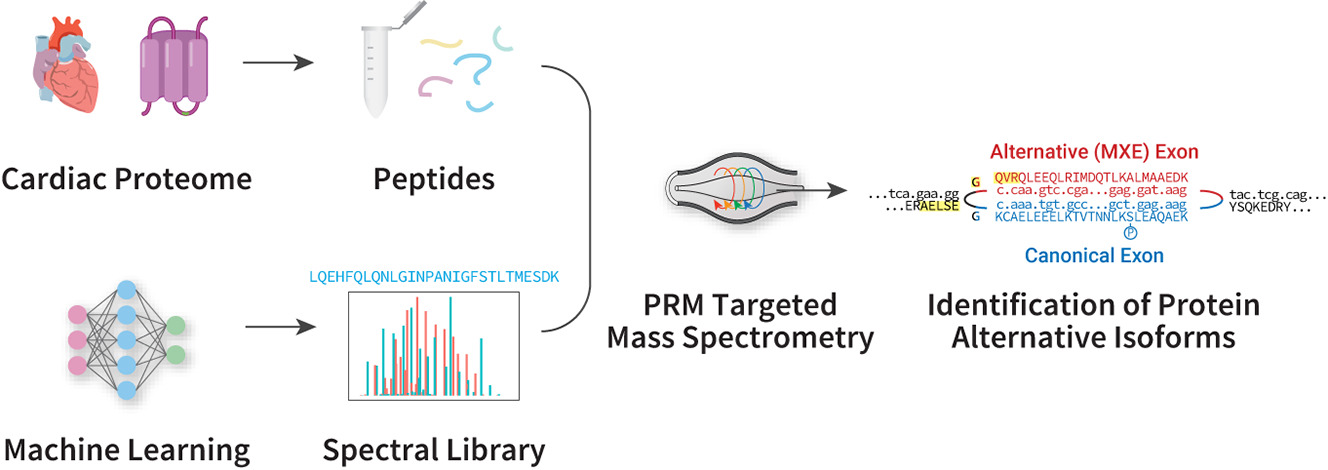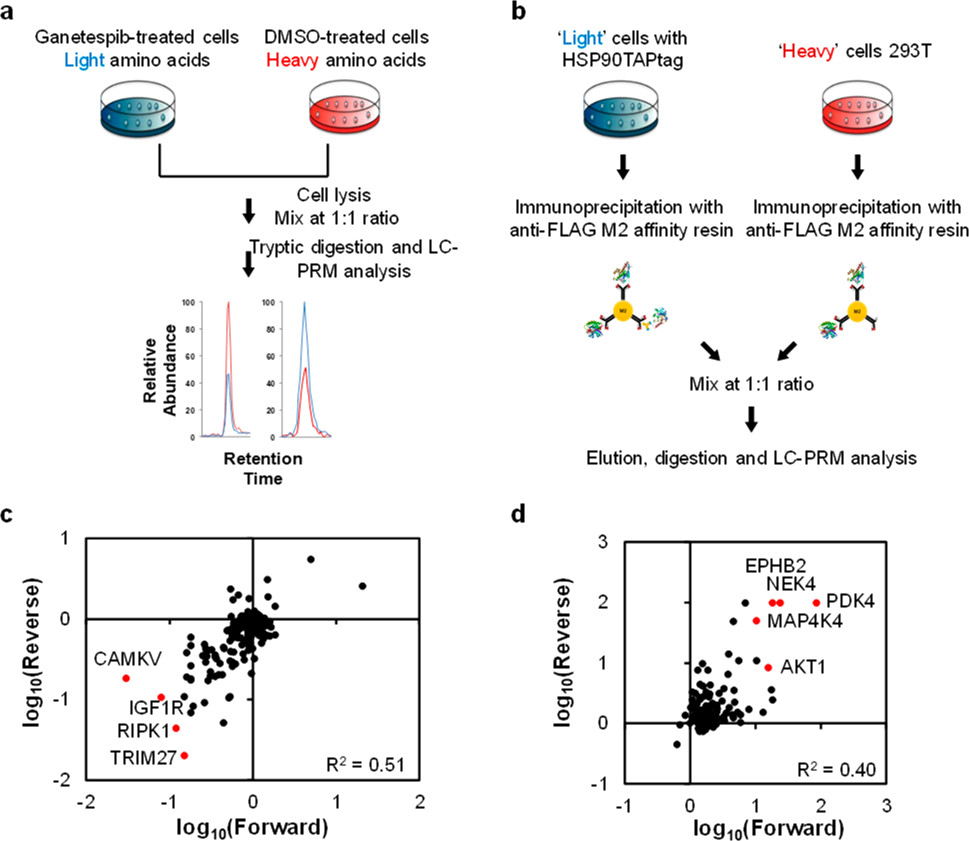PRM Targeted Proteomics Analysis Service
PRM (Parallel Reaction Monitoring) targeted proteomics is a highly sensitive and specific method primarily used for qualitative and quantitative analysis of specific target proteins. Its core principle involves the pre-selection of characteristic peptide precursor ions of the target protein, fragmentation in the mass spectrometer, and simultaneous monitoring of all fragment ion signals. By utilizing a full-scan mode to obtain complete fragment ion spectra, precise quantification is achieved through database matching. PRM technology enhances the accuracy and reliability of quantitative analysis by concurrently monitoring both precursor and fragment ions of multiple target peptides. Compared to traditional techniques, PRM offers higher selectivity and reproducibility, making it particularly suitable for detecting low-abundance proteins.
PRM targeted proteomics analysis service is widely applied in biomedical research. In disease biomarker validation, PRM enables large-scale sample verification of candidate biomarkers. In drug development, it facilitates dynamic monitoring of pharmacodynamic target proteins and toxicity assessments. In fundamental research, PRM is used for quantitative analysis of key signaling pathway proteins and studies of post-translational modifications. In recent years, with advancements in mass spectrometry hardware and data analysis algorithms, PRM has demonstrated significant value in precision medicine, tumor classification, and metabolic disease mechanism elucidation. It serves as a crucial technological bridge between proteomics discovery research and clinical translational applications.

Han, Y. et al. Journal of Molecular and Cellular Cardiology, 2021.
Figure 1. PRM Targeted Proteomics Workflow for Detecting Protein Isoforms in the Heart.
Services at MtoZ Biolabs
Based on the Thermo Fisher Orbitrap Fusion Lumos mass spectrometer combined with the Nano-LC system, MtoZ Biolabs offers PRM targeted proteomics analysis service which enables precise and sensitive quantification of specific proteins and post-translational modifications (PTMs). This service ensures high-resolution and high-sensitivity data acquisition. Through precise targeted mass spectrometry analysis, PRM effectively detects low-abundance target proteins, providing accurate quantitative information.
Service Advantages
1. Advanced Analysis Platform
MtoZ Biolabs established an advanced PRM targeted proteomics analysis service platform, guaranteeing reliable, fast, and highly accurate analysis service.
2. One-Time-Charge
Our pricing is transparent, no hidden fees or additional costs.
3. High-Data-Quality
Deep data coverage with strict data quality control. AI-powered bioinformatics platform integrates all proteomics analysis data, providing clients with a comprehensive data report.
4. Applicable to Various Research Scenarios
Whether for small molecule drug target validation, disease biomarker screening, or protein analysis of complex disease mechanisms, PRM provides precise quantitative data. It is widely applied in clinical research, drug development, and other related fields.
5. Customized Services
MtoZ Biolabs provides tailored services to address your unique research questions and experimental needs.
Applications
1. Biomarker Validation and Quantification
PRM targeted proteomics analysis service is utilized for validating and quantifying potential biomarkers, playing a crucial role in the early diagnosis and prediction of diseases such as cancer and neurodegenerative disorders. By precisely measuring the concentration changes of biomarker proteins, PRM helps researchers identify disease-specific proteins.
2. Protein-Protein Interaction Studies
PRM technology is applicable for investigating complex protein networks and interactions. Through targeted quantitative analysis of proteins, PRM can reveal interaction patterns between proteins, providing essential insights into cellular signaling pathways and pathological mechanisms.
3. Post-Translational Modification (PTM) Analysis
PRM targeted proteomics analysis service is widely used for the precise quantification of post-translational modifications (PTMs) such as phosphorylation, acetylation, and ubiquitination. By specifically targeting modification sites, PRM helps uncover subtle regulatory changes in protein function, particularly in cellular stress responses and signal transduction processes.
4. Drug Development and Clinical Applications
In drug development, PRM can be employed to detect and validate drug target proteins, assessing the effects of drugs on protein expression and modifications. This technique also aids in analyzing protein changes in patients after drug treatment, facilitating the development of personalized therapeutic strategies.
Case Study
1. PRM Targeted Proteomics Analysis of HSP90 and Kinase Interactions
This study aimed to systematically elucidate the molecular mechanisms underlying the interaction between heat shock protein 90 (HSP90) and the kinase family, as well as its potential value in cancer therapy. By constructing the HSP90-kinase interaction network, PRM targeted proteomics analysis combined with co-immunoprecipitation (CO-IP) enrichment strategies was employed to quantitatively analyze 218 HSP90-bound kinases across 12 tumor cell lines. Using the Thermo Fisher Orbitrap Fusion Lumos mass spectrometry platform, precursor ion selection and full-scan detection of fragment ions were performed. Peptide quantification was conducted using Skyline software, revealing that HSP90 preferentially interacts with kinases in the PI3K/AKT/mTOR and MAPK signaling pathways (e.g., AKT1, ERK2), with interaction strength positively correlated with kinase activation status (r=0.82). In vitro phosphorylation assays further validated that the HSP90 inhibitor 17-AAG significantly reduced kinase stability (degradation rate >60%). These findings confirm that HSP90 maintains kinase function through dynamic conformational regulation, providing new insights into the development of combination targeted therapies based on the kinase-HSP90 interaction network. Additionally, the study established the first large-scale quantitative database of kinase-HSP90 interactions.

Miao, W L. et al. Analytical Chemistry, 2019.
Figure 2. PRM-based Targeted Proteomic Approach for Examining the Interaction Between HSP90 and the Human Kinome.
Deliverables
1. Comprehensive Experimental Details
2. Materials, Instruments, and Methods
3. Data Analysis, Preprocessing, and Estimation
4. Bioinformatics Analysis
5. Raw Data Files
MtoZ Biolabs, an integrated Chromatography and Mass Spectrometry (MS) Services Provider, provides advanced proteomics, metabolomics, and biopharmaceutical analysis services to researchers in biochemistry, biotechnology, and biopharmaceutical fields. Our ultimate aim is to provide more rapid, high-throughput, and cost-effective analysis, with exceptional data quality and minimal sample consumption. Free project evaluation, welcome to learn more details!
How to order?







